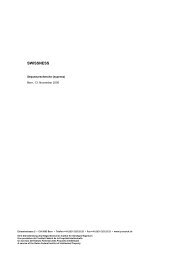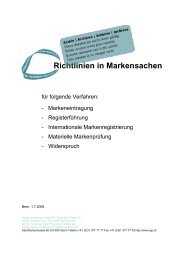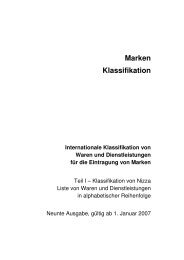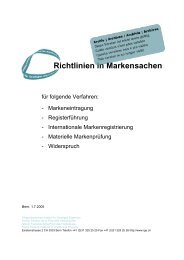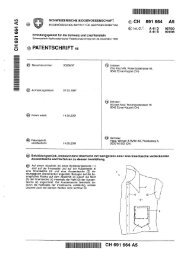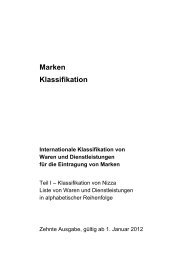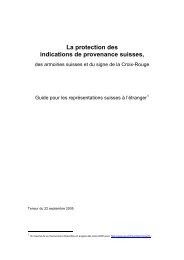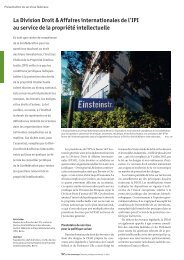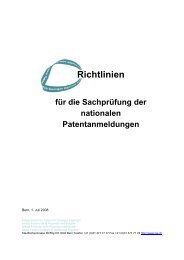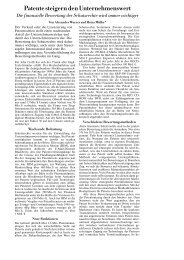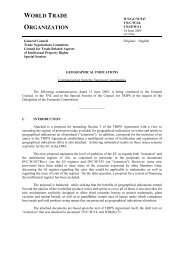AVIS DE DROIT PROTECTION DES SIGNES NATIONAUX
AVIS DE DROIT PROTECTION DES SIGNES NATIONAUX
AVIS DE DROIT PROTECTION DES SIGNES NATIONAUX
You also want an ePaper? Increase the reach of your titles
YUMPU automatically turns print PDFs into web optimized ePapers that Google loves.
ETATS-UNIS<br />
The penalties vary widely from state to state: West Virginia 381 , for example, provides for a<br />
fine of between $5 and $100 and/or imprisonment for up to 30 days whereas the Montana<br />
law 382 provides for fines of up to $50’000 and/or imprisonment for up to 10 years.<br />
Some states, such as Louisiana 383 , Minnesota 384 and Wisconsin 385 , have specific exceptions<br />
for jewelry, personal stationary or other similar items.<br />
State Seals<br />
Twenty-five States have a statute that prohibits unauthorized commercial use of their state<br />
seal by: (1) expressly prohibiting unauthorized use for commercial purposes; (2) prohibiting<br />
all non-governmental uses; (3) allowing educational or commemorative uses only with prior<br />
approval; or (4) imposing restrictions on private party use of reproductions of the state seal. 386<br />
There is controversy in the case law concerning whether or not a seal is copyrightable subject<br />
matter. 387<br />
3. Mise en œuvre de la législation<br />
a) Qui intervient?<br />
The Flag<br />
We have seen that this is generally a matter of state law and the specific procedures will<br />
therefore vary from state to state. As an example, Illinois law provides that a suit is to be<br />
brought by and in the name of the state and penalties are to be paid to the state treasury. It is<br />
the duty of sheriffs, chiefs of police and city marshals to enforce this law 388 .<br />
“Made in USA”/“Assembled in USA”<br />
The Federal Trade Commission (FTC) is charged with preventing deception and unfairness<br />
in the marketplace. The FTC Act 389 gives the Commission the power to bring law<br />
enforcement actions against false or misleading claims that a product is of U.S. origin.<br />
Traditionally, the Commission has required that a product advertised as Made in USA be<br />
"all or virtually all" made in the U.S. After a comprehensive review of Made in USA and<br />
other U.S. origin claims in product advertising and labeling, the Commission announced in<br />
381<br />
West Virg. Stat §61-1-8.<br />
382<br />
Montana Code §45-8-215.<br />
383<br />
Louisiana Rev. Stat. 14:117.<br />
384<br />
Minn. Stat. 609.40.<br />
385<br />
Wisc. §946.06.<br />
386<br />
Jessica Miedema, Robart v. Alaska: a New Interpretation for Copyrightable Subject Matter?17 LOY.<br />
CONSUMER L. REV. 309, 323, 2005..<br />
387<br />
Id.<br />
388<br />
Ill. Stat.§ 718A.2.<br />
389<br />
Federal Trade Commission Act (1914), 15 U.S.C. §§ 41-51. Excerpts available at:<br />
http://www.stolaf.edu/people/becker/antitrust/statutes/ftc.html.<br />
215



